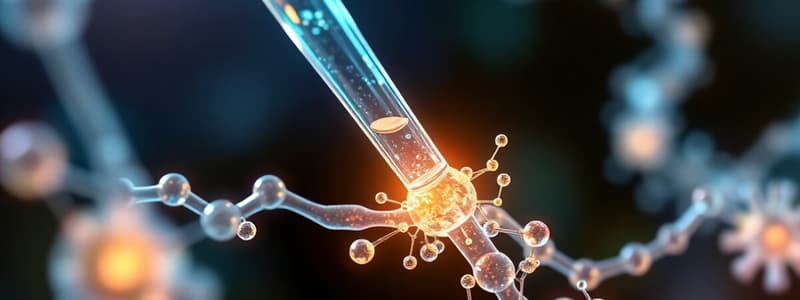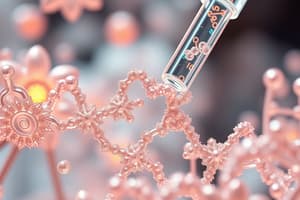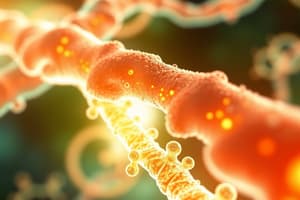Podcast
Questions and Answers
What occurs during the exponential phase of PCR amplification?
What occurs during the exponential phase of PCR amplification?
Which PCR type allows for measurements during the reaction process?
Which PCR type allows for measurements during the reaction process?
What is the primary purpose of gel electrophoresis?
What is the primary purpose of gel electrophoresis?
What characterizes the plateau phase of PCR amplification?
What characterizes the plateau phase of PCR amplification?
Signup and view all the answers
What is a key feature of conventional PCR?
What is a key feature of conventional PCR?
Signup and view all the answers
What is the primary enzyme used in the Polymerase Chain Reaction (PCR)?
What is the primary enzyme used in the Polymerase Chain Reaction (PCR)?
Signup and view all the answers
In gel electrophoresis, how does the size of molecules affect their migration through the gel?
In gel electrophoresis, how does the size of molecules affect their migration through the gel?
Signup and view all the answers
During which step of the PCR does the separation of DNA strands occur?
During which step of the PCR does the separation of DNA strands occur?
Signup and view all the answers
What is the purpose of primers in the PCR process?
What is the purpose of primers in the PCR process?
Signup and view all the answers
What distinguishes Droplet Digital PCR from other types of PCR?
What distinguishes Droplet Digital PCR from other types of PCR?
Signup and view all the answers
What is typically used as a matrix in gel electrophoresis for the separation of nucleic acids?
What is typically used as a matrix in gel electrophoresis for the separation of nucleic acids?
Signup and view all the answers
What is the correct order of the PCR cycling reactions?
What is the correct order of the PCR cycling reactions?
Signup and view all the answers
What role do dNTPs play in PCR?
What role do dNTPs play in PCR?
Signup and view all the answers
Which technique is used to separate nucleic acids or proteins, as mentioned in molecular biology techniques?
Which technique is used to separate nucleic acids or proteins, as mentioned in molecular biology techniques?
Signup and view all the answers
In which temperature range does the annealing step of PCR occur?
In which temperature range does the annealing step of PCR occur?
Signup and view all the answers
Which component of the PCR reaction maintains the suitable pH for enzymatic activity?
Which component of the PCR reaction maintains the suitable pH for enzymatic activity?
Signup and view all the answers
What is the primary function of TaqMan probes in real-time PCR?
What is the primary function of TaqMan probes in real-time PCR?
Signup and view all the answers
What is one advantage of SYBR Green dye compared to TaqMan probes?
What is one advantage of SYBR Green dye compared to TaqMan probes?
Signup and view all the answers
What is fluorescence resonance energy transfer (FRET) in the context of TaqMan assays?
What is fluorescence resonance energy transfer (FRET) in the context of TaqMan assays?
Signup and view all the answers
What is a primary difference between real-time PCR and Droplet Digital PCR?
What is a primary difference between real-time PCR and Droplet Digital PCR?
Signup and view all the answers
Which of the following is NOT a characteristic of real-time PCR?
Which of the following is NOT a characteristic of real-time PCR?
Signup and view all the answers
Which statement accurately describes SYBR Green dye?
Which statement accurately describes SYBR Green dye?
Signup and view all the answers
What is a disadvantage of using SYBR Green dye in PCR assays?
What is a disadvantage of using SYBR Green dye in PCR assays?
Signup and view all the answers
What is the maximum concentration of nucleic acids typically required for effective real-time PCR?
What is the maximum concentration of nucleic acids typically required for effective real-time PCR?
Signup and view all the answers
Study Notes
Molecular Biology Techniques
- Techniques are categorized into those dealing with nucleic acids and those dealing with proteins
- Nucleic acid techniques include PCR, cloning, Southern blotting, and Northern blotting
- Protein techniques include Western blotting, ELISA, and flow cytometry
PCR Components, Principle, and Phases
- PCR (Polymerase Chain Reaction) is an in vitro technique used to amplify specific genetic material
- PCR is called "Polymerase" because DNA polymerase (Taq polymerase) is the enzyme used in the reaction
- PCR is called "Chain" because products of one reaction become substrates for the next, creating a chain reaction
PCR Components
- Target DNA: Contains the sequence to be amplified
- Primers: Short, single sequences of nucleotides complementary to the target gene
- dNTPs: Deoxynucleotide triphosphates—building blocks for new DNA strands
- Taq DNA Polymerase: A thermostable enzyme that makes new strands of DNA; isolated from Thermus aquaticus, a thermophilic bacteria
- Mg++ ions: Cofactor of the enzyme
- Buffer solution: Maintains the pH of the reaction suitable for enzyme activity
PCR Principle
- PCR reactions are repeated 30-40 times (cycles)
- The reaction is repeated on an automated thermal cycler, which heats and cools tubes quickly
- There are three major steps in a PCR cycle
Steps of PCR
- Denaturation (95°C): High heat separates DNA strands
- Annealing (50-65°C): Cool reaction, primers bind to single template strands
- Extension (72°C): Raise temperature, Taq polymerase synthesizes new DNA strands
Phases of PCR Amplification
- Exponential Phase: Initial phase of amplification; excess reaction components; real-time PCR measurements taken during this phase
- Linear Phase: The second phase of amplification; reaction components are consumed; amplification slows
- Plateau Phase: Final phase of amplification; complete reaction; no more products; traditional PCR takes measures during this phase
Types of PCR
- Conventional PCR: Qualitative technique where products are analyzed after the reaction
- Real-time PCR: Also known as quantitative PCR (qPCR); analyzes products during the reaction
- Droplet digital PCR: Advanced, highly sensitive technique for low-concentration nucleic acid amplification;
- Reverse-Transcriptase PCR: Uses reverse transcriptase to synthesize cDNA from target RNA, then amplifies cDNA
Gel Electrophoresis
- Electrophoresis separates charged molecules by their size and charge in an electric field
- Agarose gel is commonly used to separate nucleic acids
- Larger molecules migrate less than smaller molecules
Studying That Suits You
Use AI to generate personalized quizzes and flashcards to suit your learning preferences.
Related Documents
Description
Test your knowledge on essential molecular biology techniques, including those related to nucleic acids and proteins. Understand various methods like PCR, cloning, and Western blotting, and explore the components and principles of PCR in detail. This quiz is perfect for students and professionals keen to strengthen their molecular biology skills.



